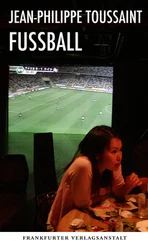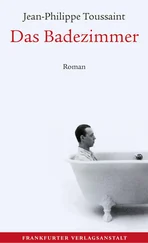Our eyes met, and I took a step in her direction, but I was stopped by the turnstile, and I understood instinctively that I couldn’t cross that line, without even asking the hostesses this much was clear to me. I kept my eyes fixed on Marie, Marie moving away from me, at once still and in motion on the steps of the escalator, as though trapped in a sudden thickening of reality, as though the world had congealed around her, Marie, paralyzed, incapable of moving in the opposite direction of the stairway, of breaking conventions and going down the escalator in the wrong direction, holding the railing and fighting against the current to join me and fall into my arms before the stunned eyes of the crowd. I watched Marie drift away from me with the slow rhythm of the rising escalator — Marie, motionless, distress in her eyes — I couldn’t keep her from going, couldn’t reach her, I was stopped at the foot of the escalator, and she couldn’t come to me, she gave me no sign, looking lost, sad, drifting away from me with the slow rhythm of the rising escalator. I watched her drift away from me with the feeling that she was passing to another side, drifting toward the beyond, an unspeakable beyond, beyond love and life, the fiery red depths of which I could see at the top of the escalator, behind the padded doors of the racetrack’s private rooms. The escalator carried them toward this mysterious territory from which I was barred, the escalator was the vehicle of their passage, a vertical Styx — metal steps with vertical ridges, black rubber handrail — carrying them to Hades.
Marie stood motionless, her eyes veiled, fixed, absent, letting herself be carried away by the escalator, powerless, saddened, and I didn’t take my eyes off her, going around the escalator and walking alongside her to keep the distance separating us constant, but I felt her drifting away from me irrevocably, my eyes locked on her to keep her in my view, feeling she was slipping away from me forever, and yet doing nothing to prevent this, making no effort to force my way past the turnstile to tear her away from her destiny. At that moment, I thought I was seeing her for the last time, I watched her slowly drift away from me on the escalator, and I wanted to take her in my arms one last time as a final good-bye. Right then I was certain that if Marie disappeared from my view at that moment, if she crossed the threshold of the heavy padded doors and stepped into the private boxes, it would be the last time I’d see her — and she’d die (but I didn’t realize then that if my horrible intuition was to come true in the coming months, it wouldn’t be Marie who was going to die but the man accompanying her).
The following summer Marie returned to Elba. Her father had died a year earlier, and nothing had been touched in his house in Elba since the previous summer, she hadn’t been back once this year, and the blinds had remained shut since she left. Marie returned to an abandoned house, dark and quiet, with a strong dusty, stagnant, wet wood smell throughout. She had to make some painful decisions, to clean out her father’s room and empty his office. She looked through some photos as she sorted various papers, she glanced with emotion at some old letters, some documents, notes, she emptied his dressers, buried her face in the wool of one of her father’s sweaters to recapture any faint trace of his smell. She remained resolute, crying softly, almost dryly, her few tears mixing with the mold and the dust of the house. Her eyes were red and itchy, as though she had asthma, and she sniffled softly, allowing her tears, salty, clear, light, to stream down her cheeks.
Marie had decided to stay in her father’s room on the second floor. She opened the windows all the way to air out the room, sluiced down the floor in the beautiful morning light, whose reflection shone on the room’s wet floor. She remade the bed, selecting a pair of batiste sheets, rustic and coarse, a little rough on the skin, the way she liked, and she piled her father’s things in boxes and suitcases that she moved to the hallway. She’d brought some fabrics from Paris to replace her father’s old curtains and bedspread, several arrangements of blue and green, the colors of La Rivercina, turquoise and indigo, azure and aqua green, ultramarine and olive, as many possible combinations as the apocryphal coat of arms of the Montalte house in Elba (with the salamander as its heraldic animal, as her father had decreed one day when one scampered across the terrace). Marie climbed onto a chair to attach the curtains to the large wooden rings of a curtain rod, and, beginning with this first night in July, she slept in her father’s room.
The following day Marie woke up early, greeted by a wan blue light filtering through the curtains. The sun had just begun to rise, and she went down barefoot to the first floor. She wandered around the dormant house and went out on the terrace, standing barefoot in the dawn’s faint light, her thighs bare under a baggy white T-shirt. The morning air was crisp, the breeze invigorating against her face and thighs. She went around the house and went into the small garden she hadn’t yet had time to visit. It was her father’s little garden, the entrance of which was protected by a rusty blue gate, which creaked when she pushed it open to go inside. A soft gray light shone on the garden, and invasive thorny broom and rampant tangled creepers blanketed the ground. Two wooden garden chairs lay folded against the surrounding stone wall, with honeysuckle climbing along its side, clinging to the gaps between the irregularly shaped stones of its surface. Of the herbs in her father’s terra-cotta pots, thyme, sage, and rosemary, nothing remained, only a hard crust of gray dirt, cracked and dry, a sole basil plant, perhaps escaped from the pots, had survived in the ground, among some bramble and the young sprouts of perennial palms bursting in tiny sprays, vegetal, green, thick, in the corners of the garden. Nor did anything remain of her father’s tomatoes — her father’s last tomatoes that she’d eaten last year crying alone in the kitchen — only a few skinny garden stakes, gnarled, arranged in an irregular line. Marie walked over to the knee-high stone wall, knelt down, and recognized there, twisted around a stem of dried reed that had served as a sort of prop, a worn, faded-blue string that her father had used in staking the tomato plants. She untied the string’s knot delicately, gazed at it at length, and then tied it around her wrist.
After showering, Marie made herself a tea, which she drank from a big bowl on the terrace, then she went to have a look in the toolshed. She dug through a pile of junk in search of a few tools, moved aside a wheelbarrow, and returned to the garden with a pick, a rake, and a pair of clippers sticking out of her pant’s back pocket like a comb. She began working in the garden, she clipped the creepers and bramble, whose scraps she raked into neat piles. She wore her father’s old straw hat, a pair of jeans, a white shirt, and rather kitschy flip-flops, with a plastic daisy in bloom in between her two big toes. Pulling up weeds, tearing out some fuller’s teasel, she cleaned up around where her father’s tomatoes had been with her bare hands. Standing on her toes, she rerouted long branches of honeysuckle, careful not to break its vines, which she transferred from the wall to a trellised espalier. Then she watered the garden, pensive, slowly moving around the enclosure while dragging behind her a rolled yellow hose, which slithered along like an obedient snake.
Below the house the horse’s paddock had been untouched since the previous summer. Marie crossed the old fence and went down formerly cultivated plots of land, now overgrown, their surfaces bumpy, rocky, uneven, where grass had shot up in irregular tufts around the ruins of small stone walls. She walked three hundred feet or so before stopping in front of the sea and gazing down at its expanse, blue, still, slack, its surface slightly ruffled at times by an imperceptible heaving. The sky met the sea at the horizon, and their two blues fused there, the deep blue of the sea and the paler, slightly hazy blue of the sky. All was calm around her, the silence of nature, the occasional chirping of birds, the flight of a butterfly, the tall grass of the property bent gently by a languid breeze.
Читать дальше












